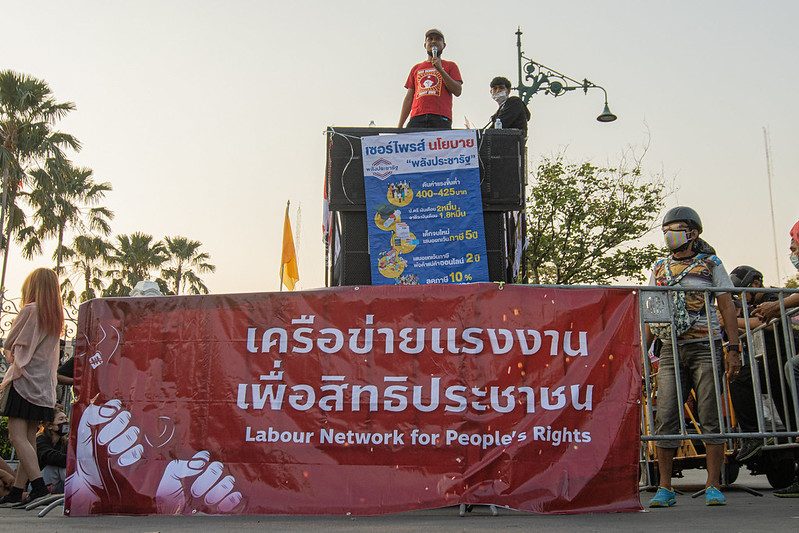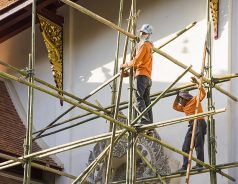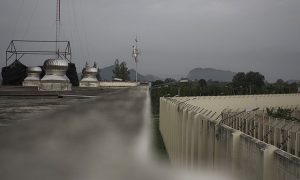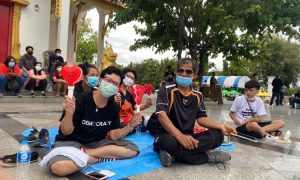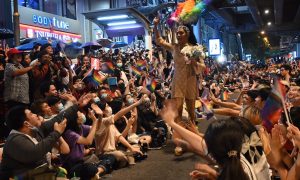“The crisis consists precisely in the fact that the old is dying and the new cannot be born.”—Gramsci
Since pro-democracy protests in 2020, Thai worker groups have not been able to mobilise on a wider scale. It begs the question as to why workers are incapable of making a concerted effort to bring down a military-backed regime despite the student-led mass mobilisation in the streets.
Thailand’s labour force has great potential to become an important ally in restoring democracy. Of Thailand’s population of 77 million, 35.5 million are in the workforce. The majority (24.6 million) are in the informal sector and excluded from social security benefits enjoyed by formal workers.
Economic and social grievances are widespread. The Thai economy contracted by 6.1 percent during COVID-19, severely impacting Thai workers. According to the International Labour Organisation, 2.2 million full-time jobs were reported lost within the first three months of 2020 alone. Those particularly vulnerable to livelihood loss are the middle class and the poor, employed in the precarious, informal sector without a stable income.
However, such deepening grievances have yet to instigate a united front among labour groups. To understand why this is so, it is important to look at the politically diverse and fragmented labour movement in Thailand.
Intra-labour group fragmentation
In the early 1970s, organisations such as the National Student Centre of Thailand (NSCT), the Trade Union Groups of Thailand (TUGT) and Labour Coordination Centre of Thailand (LCCT) helped to catalyse political consciousness that forged unity among workers, students and peasants. Over a brief but intensive period, the TUGT and LCCT served as main coordinating centres that mobilised workers to lead and join general strikes against the Thanom Kittikachorn regime. These two organisations disappeared soon after. General strikes subsequently become historical references of which new generations were only reminded by the recent Myanmar Civil Disobedience Movement.
On the whole, the Thai labour movement has always been weak and divided. As Thai Labour Scholar Napaporn Ativanichayapong observed, the Thai labour movement post-1976 was no longer led by class-based labour organisations like LCCT but three more narrowly defined groups: national labour congresses, trade unions, and labour NGOs. Over the 1980s, Thai workers saw the national labour congresses co-opted by the institutionalisation of industrial labour relations, whereas state enterprise unions led by the State Enterprise Relations Confederation (SERC) gained strength but were increasingly inward-looking.
SERC was able to organize independently of national labour congresses and NGOs. It championed the interests of its approximately 180,000 members but failed to garner broader labour or public support. Over the next few decades, the national trade movement led by SERC was significantly weakened and exhausted, if not decimated.
Thai workers had previously relied on strikes to exert leverage over employers. However, the 1975 Labour Relations Act that codifies the right to unionise allows only formal workers to organise. It also prohibits the use of strikes at the point of production. Therefore, workers are not even permitted to hold spontaneous strikes. They can only do so after a labour dispute takes place, or when the collective bargaining process meets an impasse. For these reasons, the legalisation of trade unions and institutionalisation of collective bargaining put an end to the “strike first, bargain second.”
The Thai labour movement today is small and unable to exercise collective power for social and political change. As asserted by Sakdina Chatrakul Na Ayudhya, forms of employment have evolved over time along with economic development in which a large portion of workers are no longer employed inside factory walls (i.e. in the informal and digital economies, or small and medium enterprises). Workers are thus excluded from freedom of association and collective bargaining. In this perspective, the labour movement that is mainly represented by large national trade unions has lost its relevance.
Labour NGOs can potentially bridge this gap by advocating for workers excluded from such rights. As in many Southeast Asian economies, labour NGOs are the backbone of the independent worker movement. One particular network that had the potential to bring together influential national labour organisations and independent groups on the fringe is the Thai Labor Solidarity Committee (TLSC). Created in 2001, it serves as a central coordinating body for union and non-union groups as well as private and public unions.
However, over the past decades, some eminent leaders of both SERC and TLSC have continued to direct the TLSC to become increasingly conservative and pro-establishment. They joined the yellow shirts in opposing former Prime Minister Thaksin Shinawatra, especially after Thaksin attempted to privatize key resources such as water and electricity.
In the lead-up to the May 2014 coup, SERC also called on unions to go on strike for the removal of the Yingluck administration thereby making way for an unelected government. The anti-Thaksin/Yingluck campaign is a major historical misstep that has caused severe democratic regression in Thailand.
Entrenched fragmentation in 2020
Labour groups mobilised following the initial wave of student-led protests in June and July 2020. On 16 August 2020, the Labour Network for People’s Rights (LNPR or เครือข่ายแรงงานเพื่อสิทธิประชาชน, a coalition of seven labour groups in industrial areas around the periphery of Bangkok Metropolitan) announced its support for the pro-democracy movement by calling for unity among workers from diverse occupations.
Trade unionists in small and medium enterprises, such as LNPR members, have struggled for recognition at the workplace level. LNPR leader Thanaporn Vichan was dismissed by her employer. She believes her dismissal had to do with her union leadership and political movement. Since 2020, Thanaporn has filed grievances at the labour court for her reinstatement. It is also worth emphasising that labour activists’ roles in democracy fronts have largely been played by women workers who receive little visibility in the male-dominated labour movement.
While the TLSC leadership continues to maintain a close relationship with the Prayut administration, the LNPR regards the current military-back government as authoritarian and oppressive. The LNPR considers the current Thai regime to be at the core of workers’ suffering. It emphasises inequality between ruling elites and working-class people. LNPR advocacy further targets unemployment, minimum wage, and safety nets for informal workers. It also asserts that the government has neglected the welfare of the workers during COVID-19 and is incapable of improving the deteriorating economy.
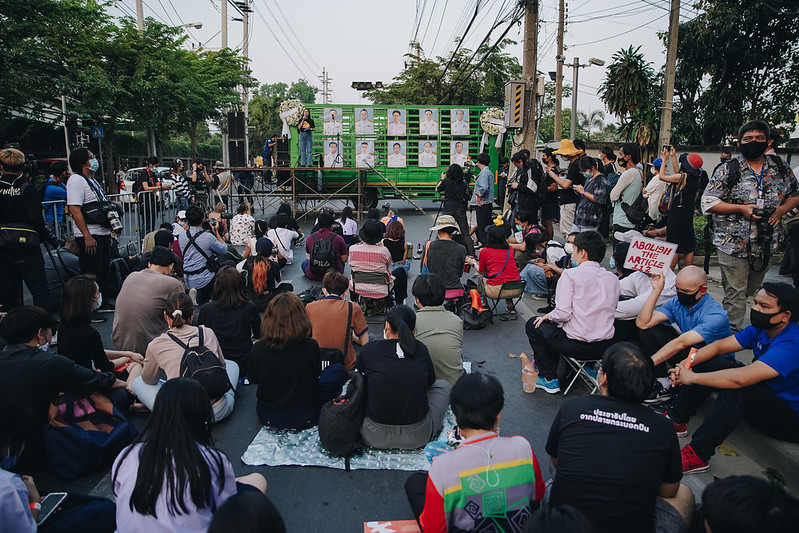
Thanaporn talking to a crowd of labour activists. #ม็อบ19กุมภา by Prachatai on Flickr CC BY-NC-ND 2.0
In the midst of the pandemic, the LNPR is one of the few labour voices that advocates for effective and inclusive relief measures for all. An LNPR open letter to the government was endorsed by NGOs working on various issues including labour, urban slums, gender equality and women’s rights.
The different stances of the TLSC and the LNPR put them at odds with each other. On the Decent Work Day in late October 2020, the two groups coincidentally organised rallies in front of the Social Security head office in order to submit demands on behalf of their constituents. While the TLSC legally requested a permit from the authority to hold a rally, the LNPR instead took a civil disobedience approach and organised their rally without a permit. As the LNPR arrived at the scene earlier, its occupation of the space was interpreted to be rather defiant and disrespectful to the TLSC.
In November 2020, the TLSC issued a formal declaration distancing themselves from the pro-democracy movement while condemning protesters for inappropriately disrespecting the monarchy. Some TLSC leaders often remind members to separate “politics from the labour agenda” when participating in TLSC events. This only serves to alienate and silence progressive voices such as Thanaporn who otherwise deserve to lead.
As Sakdina proposes, the first steps that the Thai labour movement should take to reclaim its vision as an inclusive political movement is to redefine its purpose and rethink whom it serves. As the TLSC still occupies a central role in the national labour movement, its compromise with the government is one factor that marginalises broader labour voices that criticise the authoritarian regime. For many unionists though, a lack of integrity and the desire for power among labour elites have pushed them to support the student-led movement, albeit on an individual basis.
Supporting the pro-democracy movement has costs. Like democracy activists, LNPR leaders have received police summons—tactics increasingly used to disrupt activists routines—that could potentially lead to serious charges. One leader even found a GPS tracker under her car while on her way to a protest in front of the German Embassy in October 2020.
Despite their challenges, leaders of the LNPR have continued to hold rallies across industrial suburbs to support the broader pro-democracy movement. The formation of the LNPR opened up space for unionists to discuss the demands of the student-led protest. The combination of labour and political grievances led the group to press for four key demands: stop harassment of students and citizens; rewrite the constitution; institutionalise social welfare schemes and progressive tax reform to reduce inequality; and, hold a new election.
That said, the extent to which The LNPR can bring rank-in-file workers to the cause is unclear, simply because division among workers is so entrenched and the discussion of monarchy reform is either shunned or frowned upon. In a sense, the LNPR seems to be better able to reach audiences outside of the labour movement rather than inside. Without more introspection, it is hard to see labour groups united in opposing the current regime in the near future.
New opportunities in the pro-democracy movement
While alliance among labour groups seems unlikely, the mobilisation of worker groups received endorsement from one of the main protest groups, Free Youth with its ‘Restart Thailand’ (RT) campaign in December 2020. The campaign notably represented Free Youth’s attempt to broaden its support base by appealing to Thai workers. It did so by invoking socialist imagery to create class consciousness among the ‘oppressed working class’, referring to students, office workers, non-uniformed staff, farmers and civil servants.
Anti-union discrimination supported by the state, fragmentation of Thai enterprises, and a paternalistic regime all contribute to low levels of unionisation.
Stopping anti-union discrimination in Thailand
It is refreshing to see the revival of student activism with so much potential and energy. The student-led movement has not only engendered an uplift in political consciousness and visions for a more equal society, but has heightened anti-authoritarian spirits. That is why the establishment is so threatened by the coming-of-age of Thailand’s youth. This is the first time in the modern Thai history that we have seen school students openly question time-honoured regulations hitherto followed blindly by earlier generations.
It is understandable that student activists reminisce about the rosy days of the 1970s, when students forged alliance with workers and farmers. As the reality of the working class in the modern and digital economy has evolved, we encourage youth activists to stay connected with the current struggles of working class such as the ongoing food delivery worker protests.
Since late 2019, the numbers of protests held by online platform-based food delivery workers have reached the record highs in labour disputes. This phenomenon exemplifies changes in the composition of the working class and illustrates strategic ways in which class-based movements could be renewed by young democracy activists.
For most youth, this upsurge of urban labour unrest is unprecedented and exciting, prompting many to take interests and show solidarity—at least online. While both the youth and food delivery workers use online tools to organise, it is the latter that has breathed a new life to strikes as a political tool and shown that strikes are still possible despite legal limitations. In addition, within the labour movement, the LNPR is perhaps one of the few workers’ groups that advocates for the rights of online platform-based workers. In this respect, we see a lot of potential for a new pro-democracy alliance to emerge.
The student movements’ emphasis on class struggle has great potential to resonate with the working population. The gap between the rich and poor is unprecedented. The number of people living in poverty rose from 4.85 million to more than 6.7 million between 2015 and 2018—the period that coincided with the junta rule (2014-2019). In the central and north-eastern regions alone, that figure increased to more than half a million in each region for the same period. According to the World Bank, Thailand is the only country in Southeast Asia to experience several increases in poverty. The social gap is widening between the urban, educated students—many of whom are leading the protest—and working class families especially in rural areas. Urban poverty is staggering but, still, far from a subject of everyday conversation among the Thai.
If the goal is to begin anew the unfinished political project of an equal society, it is thus crucial for democracy activists to secure broader support for the movement. Young activists can take the lead to better understand structural and everyday barriers that workers face in exercising their freedom of expression and association, especially in the context of extreme inequality. By doing so, they can forge a powerful alliance for democracy that has great potential to transform the Thai society.
 Facebook
Facebook  Twitter
Twitter  Soundcloud
Soundcloud  Youtube
Youtube  Rss
Rss 